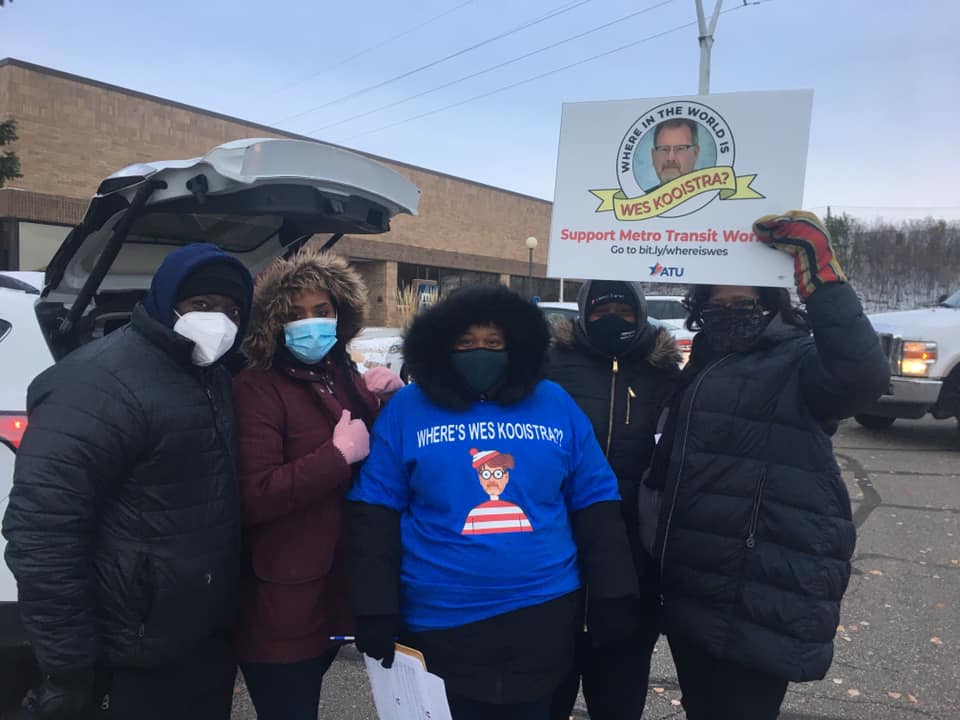
Members of ATU Local 1005 demonstrated outside as their bargaining team met with Metro Transit in October. The action succeeded in pushing the agency off its demand for a one-year contract with no wage increases. (ATU photo)

Share
Members of Amalgamated Transit Union Local 1005 have authorized a strike, held informational picketing and, most recently, petitioned the governor – all in an effort to shift their contract talks with Metro Transit into higher gear.
The union of 2,350 transit operators and mechanics entered bargaining this summer looking to address health and safety concerns related to the COVID-19 pandemic. Those discussions have yet to take place, Local 1005 President Ryan Timlin said, despite the union’s pressure campaign.
“The actions we’ve done have had an effect,” Timlin said. “We’ve seen a little bit of movement, but not nearly enough, in our opinion. The Met Council and Metro Transit are still dragging their feet.”
It’s not unusual for contract talks at Metro Transit – or any public agency – to progress at a deliberate pace. But Local 1005 members say this round of talks warrants greater urgency.
Transit workers are seeking clear language ensuring access to personal protective equipment and hand sanitizer at Metro Transit facilities. They want language ensuring paid leave for workers who come into contact with the coronavirus on the job.
Union members want hazard pay, too.
In a letter to Gov. Tim Walz sent Dec. 7, Timlin called transit operators “Minnesota’s forgotten front-line workers,” even though many essential workers rely on public transit to get to and from their jobs.
Between boarding stops, Timlin said, the air inside Metro Transit buses is trapped and recirculated from the back of the bus to the front. Light-rail trains have slightly better airflow.
Sharing confined, modular spaces with the public has almost certainly put transit operators at high risk for contracting the coronavirus.
“We’ve had quite a few of our members get COVID,” Timlin said. “We haven’t had a death yet. We’ve been lucky. But I use the word ‘yet’ because I fear it’s going to happen down the road with how susceptible the workforce is.”
ATU members voted overwhelmingly in September to authorize their bargaining team to call a strike. At that time, Metro Transit was demanding a one-year contract with no wage increases or hazard pay, rather than the normal two- or three-year deal.
While the pandemic has reduced fare revenue, Metro Transit is partially funded by a tax on new car sales, which have increased during the pandemic. The Met Council, which oversees the agency, also has had access to pandemic-relief funds through the CARES Act.
Metro Transit management changed its tune Oct. 26 and agreed to discuss a longer-term contract, after transit workers and their supporters rallied outside the Bureau of Mediation Services offices in St. Paul, where representatives of the two sides were meeting.
Since then, the union has been ramping up public pressure on Metro Transit’s general manager, Wes Kooistra, as well as members of the Met Council. The union says it has delivered over 10,000 emails to Met Council members and 500 phone calls. (Click here to send an email supporting Metro Transit workers.)
But their concerns have fallen on deaf ears.
“We are not eager to strike, but we are preparing for that eventuality, in the name of safety and justice,” Timlin wrote in his letter seeking Walz’s help. “We need someone to intervene, to compel Metropolitan Council members to do their jobs with the same vigor we do our own.”
The governor’s office acknowledged the letter, Timlin said, and was working to set up a meeting.

